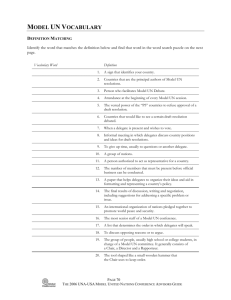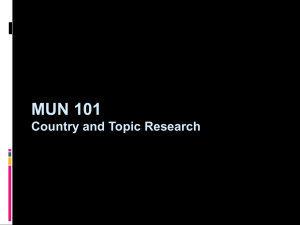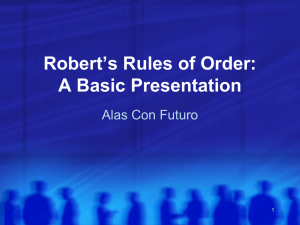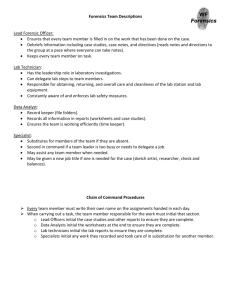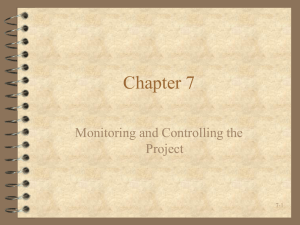The Lowest Common Denominator
advertisement
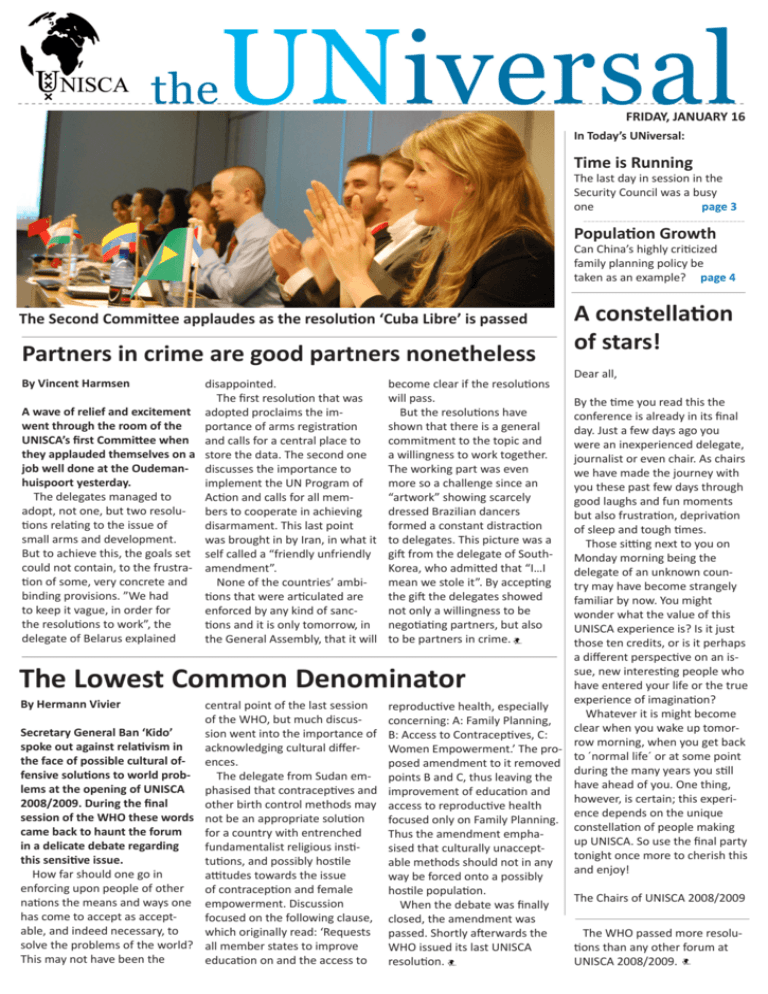
FRIDAY, JANUARY 16 In Today’s UNiversal: Time is Running The last day in session in the Security Council was a busy one page 3 ----------------------------------------- Population Growth Can China’s highly criticized family planning policy be taken as an example? page 4 The Second Committee applaudes as the resolution ‘Cuba Libre’ is passed Partners in crime are good partners nonetheless By Vincent Harmsen disappointed. The first resolution that was A wave of relief and excitement adopted proclaims the imwent through the room of the portance of arms registration UNISCA’s first Committee when and calls for a central place to they applauded themselves on a store the data. The second one job well done at the Oudeman- discusses the importance to huispoort yesterday. implement the UN Program of The delegates managed to Action and calls for all memadopt, not one, but two resolu- bers to cooperate in achieving tions relating to the issue of disarmament. This last point small arms and development. was brought in by Iran, in what it But to achieve this, the goals set self called a “friendly unfriendly could not contain, to the frustra- amendment”. tion of some, very concrete and None of the countries’ ambibinding provisions. ”We had tions that were articulated are to keep it vague, in order for enforced by any kind of sancthe resolutions to work”, the tions and it is only tomorrow, in delegate of Belarus explained the General Assembly, that it will become clear if the resolutions will pass. But the resolutions have shown that there is a general commitment to the topic and a willingness to work together. The working part was even more so a challenge since an “artwork” showing scarcely dressed Brazilian dancers formed a constant distraction to delegates. This picture was a gift from the delegate of SouthKorea, who admitted that “I…I mean we stole it”. By accepting the gift the delegates showed not only a willingness to be negotiating partners, but also to be partners in crime. A constellation of stars! Dear all, By the time you read this the conference is already in its final day. Just a few days ago you were an inexperienced delegate, journalist or even chair. As chairs we have made the journey with you these past few days through good laughs and fun moments but also frustration, deprivation of sleep and tough times. Those sitting next to you on Monday morning being the delegate of an unknown country may have become strangely familiar by now. You might wonder what the value of this UNISCA experience is? Is it just those ten credits, or is it perhaps a different perspective on an issue, new interesting people who have entered your life or the true experience of imagination? By Hermann Vivier central point of the last session reproductive health, especially Whatever it is might become of the WHO, but much discusconcerning: A: Family Planning, clear when you wake up tomorSecretary General Ban ‘Kido’ sion went into the importance of B: Access to Contraceptives, C: row morning, when you get back spoke out against relativism in acknowledging cultural differWomen Empowerment.’ The proto ´normal life´ or at some point the face of possible cultural ofences. posed amendment to it removed during the many years you still fensive solutions to world probThe delegate from Sudan em- points B and C, thus leaving the have ahead of you. One thing, lems at the opening of UNISCA phasised that contraceptives and improvement of education and however, is certain; this experi2008/2009. During the final other birth control methods may access to reproductive health ence depends on the unique session of the WHO these words not be an appropriate solution focused only on Family Planning. constellation of people making came back to haunt the forum for a country with entrenched Thus the amendment emphaup UNISCA. So use the final party in a delicate debate regarding fundamentalist religious instisised that culturally unaccepttonight once more to cherish this this sensitive issue. tutions, and possibly hostile able methods should not in any and enjoy! How far should one go in attitudes towards the issue way be forced onto a possibly enforcing upon people of other of contraception and female hostile population. The Chairs of UNISCA 2008/2009 nations the means and ways one empowerment. Discussion When the debate was finally has come to accept as acceptfocused on the following clause, closed, the amendment was able, and indeed necessary, to which originally read: ‘Requests passed. Shortly afterwards the The WHO passed more resolusolve the problems of the world? all member states to improve tions than any other forum at WHO issued its last UNISCA This may not have been the education on and the access to UNISCA 2008/2009. resolution. The Lowest Common Denominator 2 Third Committee buries itself FRIDAY, JANUARY 16 Italy only country voting against Third Committee’s resolution on water and sanitation By Liza Jansen By Stijn Roelofs Yesterday the Third Committee addressed the issue of environmental refugees, a topic of high priority to all states concerned about the indirect consequences of climate change. But discussions dragged on. While Italy was the only country to vote against the resolution on Water and Sanitation, it found itself less isolated on this topic than in earlier session. (For a full report on his stance, see the interview with him elsewhere in this paper.) The United States showed to be a natural leader when coming to the first draft resolution. Being a native English speaker with substantial know-how, this delegate got the majority of the countries to stand around her and raise their hands if they had any questions during of the committee’s unmoderated caucases. However, when the attention of the Committee turned to Global Warming and the Kyoto Protocol, Sweden took over and convinced the majority of delegates of the country’s points of view. “The United States showed to be a natural leader when coming to the first draft resolution” The last session was in danger of reaching a disappointing end with two failed motions for closure and a load of amendments that still had to be voted on. It appeared the Third Committee had buried itself under their own well-intended speeches and amendments. The United States stated to be disappointed by the speed, but insisted that it wanted every country to be heard, prior to voting. When this paper when to press, there was still no consensus on the topic of Environmental Refugees. to vote against. The recognition of water as a basic human right, is an issue of key importance for Italy. In 2007 the Italian parliament adopted a resolution urging all its diplomatic services to promote the explicit acknowledgement of water as a human right, specifically mentioning the United Nations as the forum in which to do so. But we cannot accept the fact that water is already considered a human right, since Italy is campaigning for the explicit acknowledgment of this right.” At noon, all but one of the delegates of the Third Committee voted in favour of adopting a resolution about water and sanitation. The resolution stressed the importance of water and sanitation as basic human needs and proclaimed that international cooperation on assistance and exchanging knowledge to realise these matters was needed. Except for China which abstained from voting, Italy was the only country voting against the resolution. The Italian delegate explained: “Although Italy supported the majority of the operative clauses, the preambulatory clause implicating that water had already been recognised as The Italian delegate (left) talking to another Committe delegate a basic human right, forced us “Unisca has been a positive experience” Looking back on the week with the Thai delegation By Kirsten Ripken On the fourth and final day of sessions the UNiversal spoke to Benita Knox, delegate for Thailand in the ECOSOC. She is an exchange student from Australia, studying political science at the University of Amsterdam. During the sessions, she appeared to be one of the delegates with a constructive input to the discussions, trying to produce a resolution on which all nations could agree. The Universal asked her to look back on the past conference week. Ecosoc “Ecosoc has had its frustrating moments, but the crisis in Zimbabwe brought a great improvement in learning to work together. This was a very positive experience and after it we were more productive.” Delegates “Working together with the other delegates was nice. Of course every country has its own interests, so sometimes it is difficult to convert them. But everyone is very friendly.” Thailand “The most important topic for Thailand this week was sustainable tourism. The tourism industry is the largest industry and Thailand is a very welcoming, but still developing nation. The resolution on this topic contains positive elements, but still it could have been more progressive about aid to developing nations.” Model United Nations “This is my first Model United Nations, but I would consider participating in a second one. It is a great experience, especially because you are able to learn about the bureaucratic part of the United Nations. The atmosphere is also really nice and it is great to be meeting new people.” Unisca “Overall Unisca has been a positive experience for me.” Thailands main issue this week was to defend sustainable tourism 3 FRIDAY, JANUARY 16 Time is running By Anton Fischer Afghanistan, the delegation continued the session negotiating The last day in session was about the issue of sexual abuse a busy one. The delegations con- by UN Peacekeepers. Although tinued working on a resolution delegates, among which the dealing with the situation of Af- delegate of Turkey, considered it ghanistan. While broad consent as a topic which would not take on developing strategies was too long, an agreement resulting found quickly, specific points in a resolution was not achieved such as the Pakistan border situ- at the time this article went to ation caused disagreement. press. A draft resolution, sponsored While all delegations exby the delegations of the US, pressed their deep concern Germany, France and Turkey led regarding the importance of to a number of amendments this issue and their willingwhich were discussed carefully. ness to find a proper solution, But relaxation was noticeable the question of prosecution of and Libya’s “dream about the perpetrators was tempestuously future of Afghanistan” became discussed. While Afghanistan fareality when a resolution was vored the establishment of a supassed. pernational court and procecuMotivated by the success tor, Lybia, Turkey, Russia, the achieved concerning the topic of US and China prefered trial and One way to get around state sovereignty Chris Heijdenrijk, delegate of Turkey to the Security Council: Can you explain Turkey`s position concerning the topic of UN peacekeepers? “We are deeply concerned about the reported misconduct and very interested in a quick reaction. Adequate training would be essential to prepare troops to act decently. Moreover, an appropriate investigation system needs to be installed.” procecution by domestic courts. Furthermore, negotiations about the implementation of a “zero tolerance policy” stirred up the diplomats. Mixed feelings of UNICEF delegate about the resolution on Universal Primary Education By Clarisse Durand-Mulin On Thursday afternoon, the delegates of the Second Committee unanimously adopted a resolution for their second topic of discussion: the United Nations Millennium Development Goal number two, “Achieving Universal Primary Education ”. The main propositions of this resolution are to increase financial and non-financial help to developing countries and to create centralized institutions to coordinate aid distribution and develop national regulations. The presence of UNICEF in the committee was very important for this topic. The delegate representing the organization came to the Universal to react after the vote and stated: “Generally, we are very satisfied. As we stated in our opening speech on Monday, what was important to us was the inclusion of teachers’ training, teaching methods, and school curriculum in the resolution. And the one adopted mentions the importance of these points. ” UNICEF delegate: “Generally, we are very satisfied”. But the organisation was a little bit disappointed about a few particular points. “The resolution is encouraging the creation of monitoring bodies to work in cooperation with the national governments of aid recipient countries which is a good thing. “However, it only emphasizes the fact that these bodies should track the development of enrolment, ” the delegate said. “We would have wanted these bodies to also keep track of literacy rates and school completion. But other countries just refused to add it. It was very frustrating.” By Laura Klompenhouwer A Security Council resolution passed on Thursday addresses the importance of investigation mechanisms during and after UN peacekeeping missions. It fails, however, to put more pressure on troop contributing countries (TCCs) to prosecute those found guilty of abuses during their mission. The articulation of national responsibility for peacekeeping personnel was opposed by many countries on the grounds that any strong language would conflict with the sovereignty of states. As, in this case, a non binding resolution would not increase the pressure on countries to assume responsibility, the international community should look for other options to hold TCCs accountable and look for casespecific ways to get around the argument of state sovereignty. The Security Council resolution luckily does refer to the role of NGOs and the media to bring abuses to light but does not specify how. One way to couple the resolution’s words to actual action is to create an alliance between the press in TCCs and the investigative bodies of the UN and NGOs. In this manner, pressure could be guaranteed from within the TCCs to prosecute whomever is proven guilty through investigation, without there being any infringements of state sovereignty. The argument of state sovereignty all too often surfaces in matters that are only distantly related to it and this situation is point in case. Executing bodies influenced by Security Council decisions should find practical ways to keep pressure on sovereign states that are involved in human rights abuses. 4 FRIDAY, JANUARY 16 China as example for controlling future population growth By Anna Bressers The rapid increase of the world population is accompanied by problems of severe environmental degradation and the increasing prevalence of diseases. To prevent the worsening of this situation, measures for checking population growth are necessary. Can China’s highly criticized family planning policy be taken as an example for accurately addressing these problems in the future? Since its implementation, China’s one-child policy has been universally criticized for being coercive and autocratic. However, since the world is facing mounting demographic pressures, such policies may be the only way to accurately address the increas- ing problems of environmental degradation and increasing diseases. Population growth is negatively linked to sustainable development. Increasing population numbers check or even nullify efforts being made on poverty, hunger, agricultural productivity and health. Measures directed at reproductive health, as implemented by the UN, are successful in decreasing birth rates but are coming short since the world population is still increasing with 200.000 people a day. The stabilization of population will prevent poverty, hunger, the prevalence of diseases and environmental degradation from worsening. By implementing its one-child policy, China’s population growth rate has stabilized. It may be considered unethical and a little too simplistic to force people to stop having children and most countries will therefore oppose policies as adopted by China. However, the abovementioned problems will become more intense in the future since more people will become in need for supplies of food, medicines and so on. The quality of life for future generations who will be affected by these problems are more important than their right to be allowed to give birth to as many children as they like. Looking at the numbers, in the future, we may not have a choice but to adopt such radical policies. Stay Awake! By Kirsten Ripken Coffee has been a popular drink this week. Delegates were hurrying in late, hair in a ‘justout-of-bed-style’ and slightly dark circles beneath their eyes. People yawned, while rubbing the sleep out of their eyes. On the last UNISCA days, all the early mornings and long sessions seemed to take their toll. Carious complaints about fatigue were made. And well, who could blame you? One would presume that stu-advertisement- dents are used to partying for nights in a row, having only a few hours of sleep a night and being able to combine this with studying and jobs. However classes usually only require a few hours a week and generally do not start in the morning. Furthermore, most students are able to catch some sleep, quietly in the back of a class, if needed. So most students are not used to such an intensive week as the UNISCA conference week, where constant attention, participation and motivation are needed. Even though most participants seemed to be tired, smiles were all around. Probably because the week has been much fun and all participants were nice, friendly and open. Besides, delegates realized it is good to practice for how life could be after graduation when they all have ‘real’ jobs, maybe even at the United Nations. So hang on tight everyone, we have just this day to go. Keep the coffee coming and try to stay awake! Or at least pretend to be… Colophon The UNiversal: The official UNISCA 2009 Newspaper Press Department: Rogier Nouwen, Veerle de Vlas, Koen Wortmann Editor in Chief: Linde Wolters Design: Jaap van Nes Journalists: Kirsten Ripken, Shari Nijman, Stijn Roelofs, Anton Fischer, Laura Klompenhouwer, Vincent Harmsen, Anna Bressers, Clarisse Durand-Mulin, Liza Jansen, Hermann Vivier pr@unisca.org Big issues, little time By Shari Nijman With only hours to go to the deadline, the UN showed yesterday how effective it can be by adopting not one but two resolutions about trade embargoes. On the longest of all UNISCA days, for most committees the extra hours in the evening had to be used to discuss the final issues on their agenda. For the second committee this meant that the issue of trade embargoes was to be debated between dinner on Thursday and the closing ceremony on Friday. With little more than three hours to discuss such a major issue, nobody knew whether it would come to a resolution at all. However, the discussion started off with several states condemning trade embargoes and progressed faster than anyone expected. Less than an hour later two working papers were about to be submitted. It wasn’t just time pressure which caused the discussion to evolve this fast. “The United States wants to slip Fidel Castro some potion” USA Delegate in a note to chair As the representative of India rightfully remarked: It’s amazing what the UN can do when the United States are not present!” Indeed the absence of one of the major players in this discussion raised hope that a resolution could be adopted well before the end of UNISCA. The, for most countries convenient, absence ended when the representative of the United States re-entered the debate and was clearly ready to rumble! Although the US rumbled away it had clearly lost its momentum and a small hour later two resolutions titled ‘Cuba Libre’ regarding the trade embargoes were passed with an overwhelming majority.
